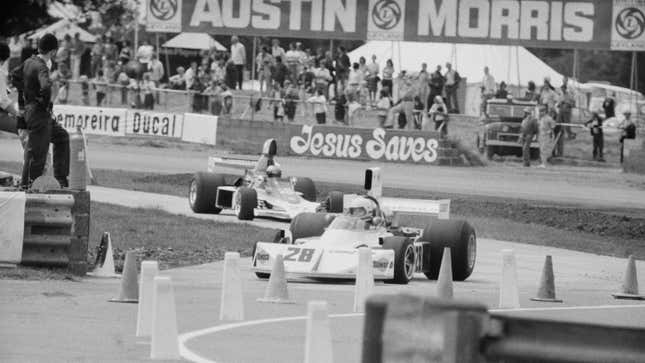
I like to consider myself something of a 1970s Formula One encyclopedia, but if there’s one person in this world who can outdo me, it’s my good pal Josh Wilcock, who taught me about a fun little racing team called Jesus Saves Racing.
I stumbled on a ‘Jesus Saves’ sponsor in a photo from the 1975 British Grand Prix while hunting for a photo of an American race car driver (which is the header photo for this story). After posting it on Twitter, Wilcock responded with a photo that completely changed the course of my day.
I had to know more.
Jesus Saves Racing was founded by a Brazilian driver named Alex Ribeiro, a man with a deep vein of religious faith running through him—which could be a difficult position to hold in the debauched racing scenes of the late-1960s and 1970s. That conflict is noted on the team’s website:
He entered the Brazilian Formula Ford championship after impressing the manager of the Hollywood team, sponsored by the country’s largest manufacturer of cigarettes and the best racing team in Brazil at that time. The decision to join the team however gave Alex a dilemma knowing there were Christians who opposed smoking, after praying about the situation the doors to two other options closed and he accepted the Hollywood offer. He subsequently won his first race for Hollywood driving a Porsche 910 sports car and was runner-up in the 1972 Formula Ford Championship
I don’t envy Ribeiro. He’s moving through the ranks of motorsport in an era where smoking was one of the coolest things you could do aside from racing cars really fast, and where tons of cigarette companies sponsored racing teams, cars, drivers, and events.
Ribeiro used sponsorship money from Souza Cruz, the aforementioned tobacco company, and Caixa Econômica Federal, a Brazilian bank, to buy his way into a seat with the March Formula One team in 1977. But team owner Max Mosley had actually hired four drivers—Ian Scheckter, Hans-Joachim Stuck, and Brian Henton—to help pay the bills. Ribeiro ran all the races that year, but the team was running out of money and had achieved nothing of note. Ribeiro scored two top-10s in an era where sixth place was the final points-scoring position. He retired from four races and didn’t qualify for eight others.
It wasn’t exactly a great way to make a first impression in Formula One. Instead of sticking around in F1, Ribeiro went a totally different route: He started up his own Formula 2 team in 1978.
Enter: Jesus Saves Racing.
Hollywood, one of Ribeiro’s previous sponsors, provided a quarter of the budget needed to set up a really profound racing effort. The team basically had enough money to run its March 782 at three races before it would need to find a new sponsorship—or take home enough prize money to make the whole endeavor worthwhile.
The first race at Thruxton was a mess. The second race at Hockenheim saw Ribeiro score two points with his sixth-place finish. It all came down to the Nürburgring, where Ribeiro would need to win in order to keep his racing endeavors going for the rest of the year.
The odds were stacked against him. The Nürburgring track is notoriously difficult. Forty-four cars entered the race, including several F1 drivers using the event as a way to scoop up extra funds outside of their elite efforts (Keke Rosberg, Ricardo Patrese, Jochen Mass, Elio de Angelis). F2 favorites included Bruno Giacomelli, who went on to win the championship, and Marc Surer, who racing journalists thought would be the drivers to triumph over the F1 crowd.
But it wasn’t. It was Alex Ribeiro in his Jesus Saves Racing car that took the win, and he did it by a mere tenth of a second. As the Jesus Saves Racing website puts it, “God provided exactly what was needed enabling the team to compete for the rest of the season.”
The prize money was good enough for Ribeiro to finish out the season and tie for eighth in the championship, but it was the last time that year he scored points.
That was pretty much it for Ribeiro’s racing career and his team. He served as a chaplain at certain F1 events and was a pastor for the Brazil national football team. He had a near-death experience at the 2002 Brazilian Grand Prix when he drove the medical car out to a minor accident; when he opened the door of the car, Nick Heidfeld crashed into it. Both Heidfeld and Ribeiro were uninjured.
But Jesus Saves Racing made a reappearance in 2013, believe it or not. Theology student and racer Alvin Davies wanted to bring it back to contest Classic Formula Ford Championship events. The iconic red livery with ‘Jesus Saves’ inscribed in its groovy font is still hitting the track.
All of that is largely to say that Ribeiro still stands as one of the few F1 drivers to use his Christian faith as a prominent component of his career. Drivers have certainly been open about religion before, but not quite to the extent that Ribeiro was, going as far as to use his own funds and his race car to talk about his faith.
But man, do I wish Jesus Saves Racing sold t-shirts.